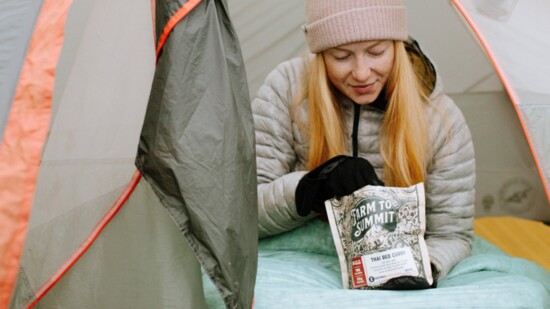Mmm. Rocks. Hard on the tongue, harder on the gut. Rocks are every backpacker’s favorite meal at the end of the long day’s trek. This statement is not hyperbole. Conventional packaged meals for backcountry feasting are typically loaded with enough preservatives to make them outlast the rocks of the Rocky Mountains.
As a professional botanist studying endangered plants in far-flung locales, Louise Barden noshed plenty of rocks. But she couldn’t stomach the adverse impacts of these foods. Not only did multiple studies link the highly processed meals to adverse health morbidities, but also a growing body of evidence showed the toxic “forever chemicals” (PFAS or per- and polyfluoroalkyl substances) in the packaging bled into bodies, water and soil webs where they never break down.
Barden decided to take action. “I really wanted to see some change,” she explains. “Owning a business is one of the best ways to implement the changes you want to see.”
Barden and a partner launched Farm to Summit (FTS), a revolutionary circular model for adventure food production. FTS diverts from landfills the comely, damaged, or excess produce that farmers cannot sell. These veggies are converted into nutritious, light-weight, dehydrated meals free of artificial preservatives. FTS skips the PFAS pouches, opting instead for omnidegradable bags that decompose naturally in any substrate.
“We’re trying to get away from the expectation that backpacking food should be bomb-proof, because the food in your pantry is not bomb-proof,” Barden attests.
Americans’ dalliance with forever foods began during the Cold War, when households built and stocked bomb shelters to withstand the fallout of a nuclear war. Food factories perfected the freeze-drying methods and sorbate cocktails needed to arrest decomposition. These convenient, immortal meals proliferated the nation’s grocery stores and NASA’s shuttle missions. By the 1970s and 80s, the military had invented Meals Ready to Eat (MREs)—boil-in-a-bag “substances” that fervently aspired to be food. The legacy products of all these innovations inevitably trickled into backcountry knapsacks.
“We’re the only company that’s doing farm-to-bag,” Barden points out. “We are definitely creating something unique [with] farm-fresh food that otherwise would have gone to waste. Packaging that’s the most sustainable on the market. Food that’s really clean, that tastes good, that’s all vegetarian.”
Since its launch in 2021, FTS has diverted tens of thousands of pounds of produce from landfills, while supporting local farmers and a sustainable regional food web. On any given day, a local farm may deliver 500 pounds of zucchini or 600 pounds of kale. Thousands of pounds of carrots arrive regularly. Barden and a small, intrepid crew shred, chop, dehydrate, and bag the bounty all in a matter of days.
“We [are] a big sink for produce in the town,” Barden says. Restaurants, grocery stores, and food pantries have no use for these harvest quantities. And, the farm-to-bag model is blossoming into unexpected arenas.
Busy parents rejoice when they rotate an FTS mac and cheese meal into their weekly dinner repertoire. Elderly individuals enjoy maximum sustenance and satisfaction even when they can no longer ably cook complex or elaborate meals. And most surprising to Barden is the relief her meals provide for unhoused individuals.
Thanks to grant dollars, Manna Soup Kitchen provides FTS meals to those in need. Barden points out, “We’re a way that [Manna] can sustain buying local food throughout the year. And, we’re also a lot easier for people to access than fresh produce.”
With so many positive impacts rippling out across the community and wider food systems, Barden is eager to see Farm to Summit’s model expand, noting, “We would love to reach more national and international markets. We’d love to be in every REI and all the local gear stores.”
And in a hobby like backpacking, that usually cannot stomach excess, chaff, bulk, and dreck in its gear, Barden is ecstatic to see her business erase the overlooked waste streams that ultimately and ironically harm the very biomes people crave.
We’re trying to get away from the expectation that backpacking food should be bomb-proof…
